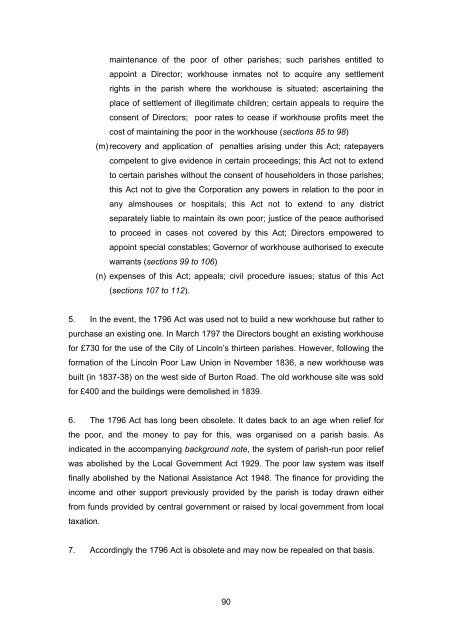Poor Relief - Law Commission
Poor Relief - Law Commission
Poor Relief - Law Commission
You also want an ePaper? Increase the reach of your titles
YUMPU automatically turns print PDFs into web optimized ePapers that Google loves.
maintenance of the poor of other parishes; such parishes entitled to<br />
appoint a Director; workhouse inmates not to acquire any settlement<br />
rights in the parish where the workhouse is situated; ascertaining the<br />
place of settlement of illegitimate children; certain appeals to require the<br />
consent of Directors; poor rates to cease if workhouse profits meet the<br />
cost of maintaining the poor in the workhouse (sections 85 to 98)<br />
(m) recovery and application of penalties arising under this Act; ratepayers<br />
competent to give evidence in certain proceedings; this Act not to extend<br />
to certain parishes without the consent of householders in those parishes;<br />
this Act not to give the Corporation any powers in relation to the poor in<br />
any almshouses or hospitals; this Act not to extend to any district<br />
separately liable to maintain its own poor; justice of the peace authorised<br />
to proceed in cases not covered by this Act; Directors empowered to<br />
appoint special constables; Governor of workhouse authorised to execute<br />
warrants (sections 99 to 106)<br />
(n) expenses of this Act; appeals; civil procedure issues; status of this Act<br />
(sections 107 to 112).<br />
5. In the event, the 1796 Act was used not to build a new workhouse but rather to<br />
purchase an existing one. In March 1797 the Directors bought an existing workhouse<br />
for £730 for the use of the City of Lincoln’s thirteen parishes. However, following the<br />
formation of the Lincoln <strong>Poor</strong> <strong>Law</strong> Union in November 1836, a new workhouse was<br />
built (in 1837-38) on the west side of Burton Road. The old workhouse site was sold<br />
for £400 and the buildings were demolished in 1839.<br />
6. The 1796 Act has long been obsolete. It dates back to an age when relief for<br />
the poor, and the money to pay for this, was organised on a parish basis. As<br />
indicated in the accompanying background note, the system of parish-run poor relief<br />
was abolished by the Local Government Act 1929. The poor law system was itself<br />
finally abolished by the National Assistance Act 1948. The finance for providing the<br />
income and other support previously provided by the parish is today drawn either<br />
from funds provided by central government or raised by local government from local<br />
taxation.<br />
7. Accordingly the 1796 Act is obsolete and may now be repealed on that basis.<br />
90
















